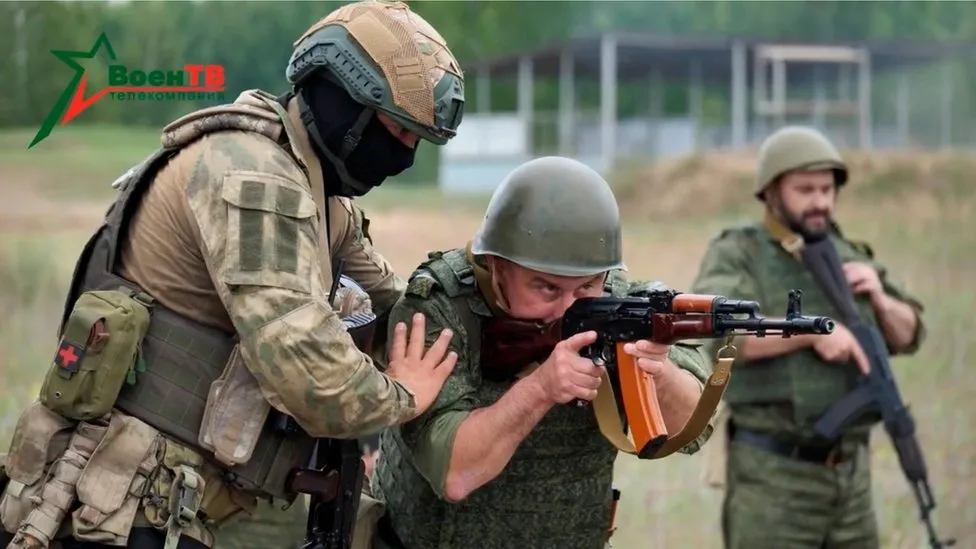Wagner mercenaries have arrived in Belarus, Ukraine confirms
Ukraine's border guard service has confirmed that Wagner mercenaries have now arrived in Belarus from neighbouring Russia.

The DPSU says it is assessing how many "militants" are in Belarus, which also shares a border with Ukraine, as well as their exact location and goals.
One unconfirmed report said a convoy of some 60 Wagner vehicles rolled over the border into Belarus early on Saturday.
In June, Wagner's mutiny challenged President Vladimir Putin's authority.
A deal ended the 24-hour rebellion, which saw the troops seize a city and march on Moscow - aborting it just 200km (124 miles) from the capital.
Under the agreement, Wagner fighters were told they could join either the regular Russian army or go to Belarus, a close ally of Russia. The Wagner leader, Yevgeny Prigozhin, was also offered a move to Belarus, however his current whereabouts are unknown.
Wagner is a Russian private military company made up of mercenary fighters - many of whom were recruited from Russian prisons. They have fought some of the bloodiest battles since Russia launched its full-scale invasion of Ukraine in February last year.
DPSU spokesman Andriy Demchenko confirmed Wagner's presence in Belarus in a short statement on Saturday.
He said Ukrainian border guards were "continuing to monitor the situation" across the country's northern border. He provided no further details.
Earlier in the day, a Telegram channel associated with a prominent Belarusian opposition blogger reported that a large Wagner convoy entered Belarus from Russia.
Belaruski Hajun channel said the vehicles - including pickups, lorries and buses - were being accompanied by Belarusian traffic police as they headed to the town of Osipovichy, about 85km (53 miles) south-east of the capital Minsk.
The Belarusian authorities - which view Belaruski Hajun as an extremist channel - have not commented on the issue.
On Friday, Belarus' defence ministry said Wagner troops were now acting as military instructors for the country's territorial defence forces. It said the fighters were training Belarusian forces "in a number of military disciplines" near Osipovichy.
Earlier this week, President Putin revealed that Prigozhin had rejected an offer for his fighters to join the Russian army as a regular unit.
He told Russia's Kommersant newspaper that many group commanders had backed the plan, to be led by a senior Wagner figure, during talks in Moscow on 29 June.
But he said that Prigozhin's reply was "the guys [Wagner troops] do not agree with this decision".
Mr Putin also said that under Russian law, Wagner "does not exist", because mercenary groups are not officially recognised. But that "difficult issue" should be discussed in parliament, the president added.
The Kremlin appears to want to differentiate between the Wagner chief and regular Wagner fighters, driving a wedge between them, says the BBC's Russia editor Steve Rosenberg in Moscow.
He adds that this would explain the attempts in Russia's state media to discredit Prigozhin.
Russian state TV takes aim at Wagner's Prigozhin
Since the 23 June mutiny, there have been conflicting and unconfirmed reports of Prigozhin's whereabouts.
He is a former Putin loyalist and once even nicknamed "Putin's chef" for his catering contracts with the Kremlin. But public infighting between Prigozhin and Russia's ministry of defence over the conduct of the war have put him at steep odds with Russia government.
US President Joe Biden said on Thursday that Prigozhin should be careful of poisoning following the mutiny.
-bbc







